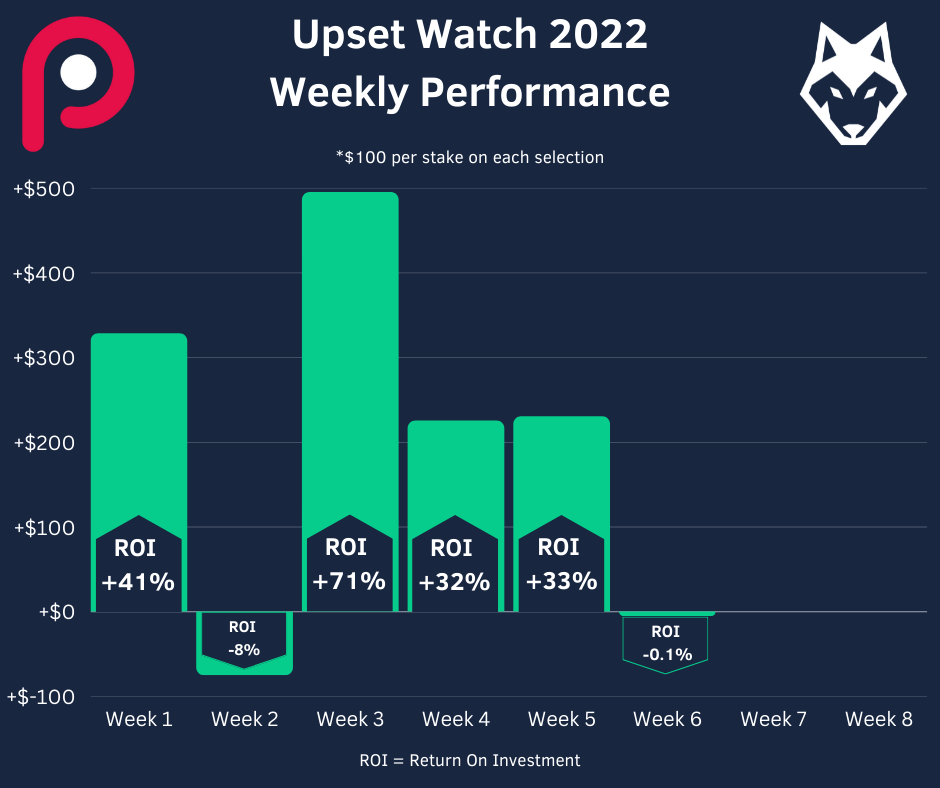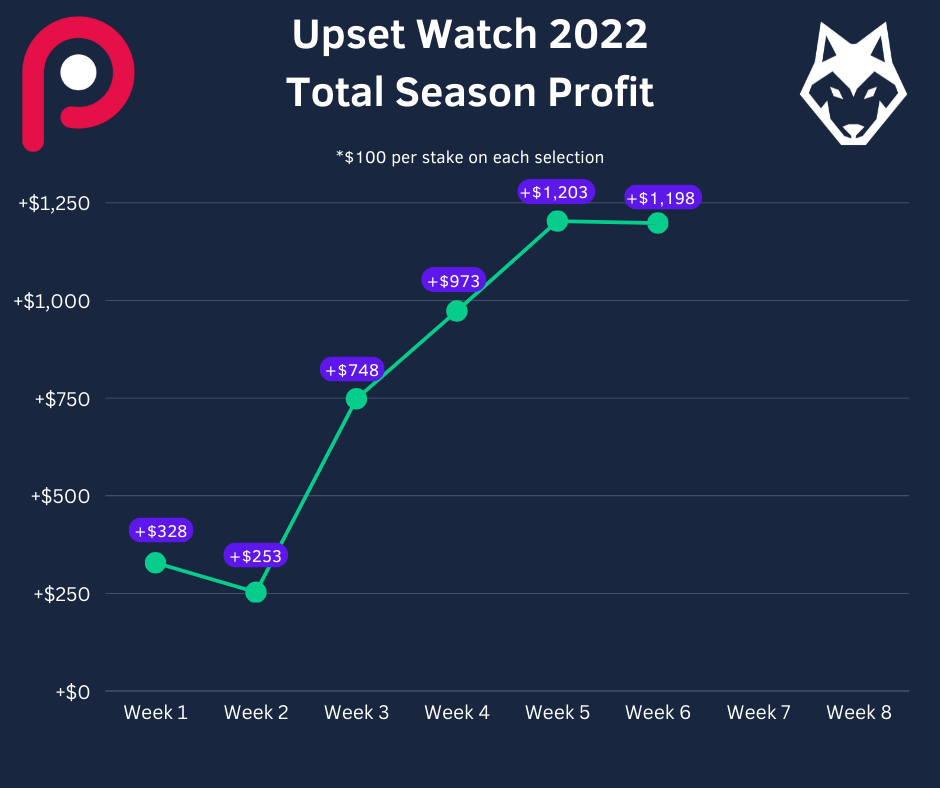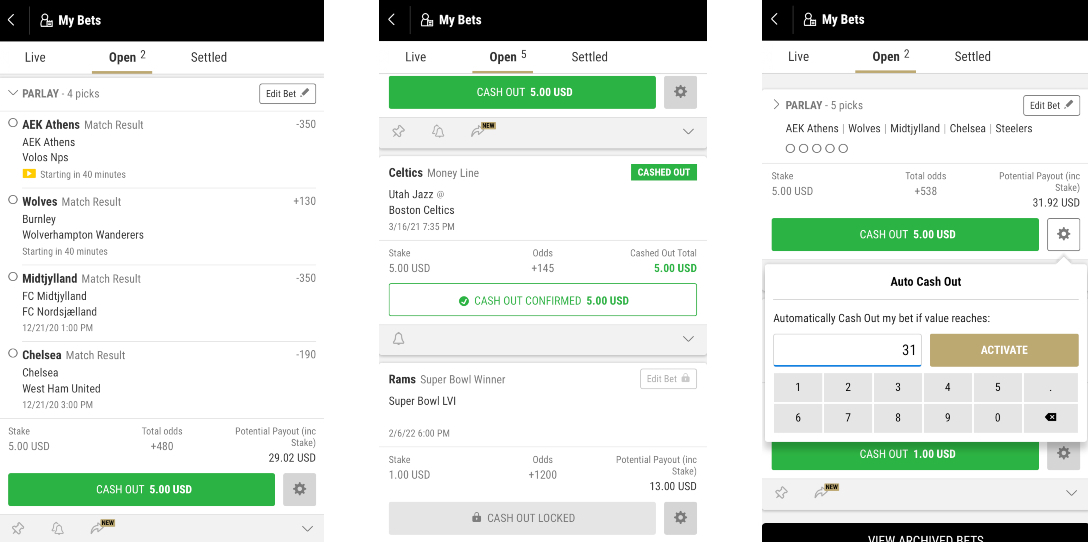Welcome to Upset Watch
If you're new to Pickwatch, or have never read Upset Watch, here's what we do:
With over 35% of NFL games ending in an underdog outright win, it's important to know when upsets are most likely to occur, and which teams to pick.
Every Wednesday, we select a number of underdogs that have a statistically higher chance of winning than others. To do this, we use historical trends, such as the number of underdogs that historically win each week, and we then use a weighted ranking of each team's current 'true' performance to assess how well they are playing, and whether the matchup is favorable.
Why underdogs and not favorites?
Because underdog winners yield bigger profits from the greater odds you face, you don't need to win every pick you make. Our motto is that with Upset Watch, you make more profit from less picks.
In 2021, betting $100 on every underdog winner that we picked would have yielded you a profit of+$3,200 over the course of the season.
NEW! Contents (click to jump to section - Pro subscription required for picks):

Week 6 was a mixed bag, and ended up with us (almost) just breaking even, albeit technically with a $5 loss. Frustratingly, the two covers I picked (Atlanta and the Jets) both won, something I was torn on and I mentioned heavily as a possibility in the reasoning for those picks. I said that both were close to being upsets and it was a timely reminder that ultimately, if we think a team is under-valued, we should be more confident, even if the spread is wildly against them.
In addition, I un-picked the Saints on Saturday evening as the injury news about Chris Olave tipped them into a situation where they started without their top 3 wideouts. I've generally tried to avoid this in 2022, but it's better that I change a pick - particularly as this wasn't last minute - than stick with something that clearly I think is too risky. In hindsight, I should then have moved the Jets up to a full underdog pick, but we live and learn!
Season Performance

Our rolling season profit is still almost double what it was at the same stage in 2021, and although it remained static in week 6, we're still in a strong position across the season as a whole, In particular, our profit from covers has been huge, with our 13 cover picks this season going 10-3, generating a profit of +$638.
As always, we base our profit on betting $100 per bet, but the profit percentage (ROI) will be the same no matter what you bet.

I get asked this question a lot, so here are some thoughts and some ways I use the picks we have. I'm going to keep this section in every week so that you can read how I think about betting on football.
First off, I am loath to say 'always bet this way' because it is often based on how much risk you want to absorb. For some people, they want to put a small stake on a big parlay of winners, and they don't mind losing that stake 99 times out of 100, as long as their big parlay comes off eventually.
1. Single game picks
- Most bettors prefer the simpler, less spectacular - but equally less risky - method of placing single game bets.
- You'll make less return on these picks, but because underdogs return more money generally, if you get 50% of your picks right, you'd make a huge profit. Last season we picked 52.3% of our underdog winners correctly for a +$3200 profit, for example.
- The pros of this method are that you will likely accumulate profit slowly over the season, and you are not relying on all of your underdogs to win. The ROI is steadier, and you are unlikely to get every pick wrong (we haven't missed on all of our picks for over 2 years).
- The con is that you will not make a massive profit for getting multiple selections right and combining them into one bet, so you won't have the monster payday.
2. Parlays
- Parlays are where we combine our picks into one bet, and we only win if all of our selections win.
- Instead of placing $20 each on five individual teams to win, we place $100 on all five to win, with the odds being multiplied for each selection.
- For example, a five team parlay, where the odds on each selection were +100, would yield total odds of +3100, so the $100 would return $3200.
- The Pros of this are obvious. If you win a big parlay, you can win huge amounts of money and it is a great feeling to nail it.
- The Con of this is also very clear: You need all of your selections to come in, and so if you miss on 1 of your 5 selections, you will return nothing for winning the other 4.
3. Round Robins
- Finally, we have the best of both worlds: Round Robins. It's more complicated, but once you understand the basics, and the fact that the sportsbooks do the work for you, it's a good method.
- A round-robin is where (as an example) you make the same five team parlay as above, but you will bet on at least 3 of those 5 selections winning. You can get a better payout by saying 4 of 5, or you can get a lower payout by saying 2 of 5, but the principle is that only some of your selections need win to generate a payout.
- To do this, the bookmaker will calculate all of the possible combinations of your teams to win. So if you have said 3 of 5 winners, they will calculate that there are 10 possible combinations of 3 teams that can win from your 5 selections.
- The odds you get are the same as if you were placing these bets manually yourself. So of the 5 teams you are picking, if you placed a bet on Team A, Team C and Team E to win and you got odds of +700 that's one bet.
- Because you need to cover off all of the combinations, the stake is multiplied by the number of bets, so instead of placing one big bet of $100, you would place 10 smaller bets of $10 each.
- The Pro of this method is that you win exponentially more bets as more of your selections win. For example, if 3 win, then you win only one bet (Teams A, B and C) but if 4 win, you would win 3 bets (Bet 1: Teams A,B and C, Bet 2: Teams A,B and D, Bet 3: Teams B, C and D). If all 5 win, you would win all 10 bets and still make a huge profit of $700 from a $100 stake.
- The other advantage is obvious - when only 3 win, you still return something. It may not actually return a profit, but the loss will be a lot smaller, and you get at least some reward rather than losing all of your stake.
- The downside of Round-Robins is that the amount of bets can be harder to manage. You're effectively placing lots of small bets rather than one big one, and while most bookmakers automate this process (for example BetMGM offer this on their bet slip as standard), it can be frustrating to say that instead of placing 1 x $100 bet, you're placing 21 * $4.76 bets because you're betting on 2 of your 7 selections coming in!
My Preferred Method
The reason I use singles to measure the performance of the column is that it is unambiguous and easy to understand from a performance point of view, but each week I will usually place a combination of the above methods.
Let's say my total bank for the week is always $1,000 and I have 5 picks I want to bet on. You can do the same with $100 by just dividing the next bit by 10, the $1000 is just illustrating the breakdown of how I bet:
- Every week without fail, I place a parlay of at least $10 on all of my picks. This is just because you never want to have everything win and not get a big payout.
- I will always place single bets on anything I am sure of, but I may hold off on some bets until the Sunday if injuries or other factors make me wary of the bet. If I think the odds will shorten, I will always place the bet early. If I think they'll lengthen, I'll wait. Ultimately, by Sunday, I've usually got all of my selections on as single bets.
I also may vary my stakes. For example, in week 3, I was big on the Jags to win, and put 4x my usual stake on at odds of +300, but for the purposes of the column, I count it as $100 at +270 because that's what you would have gotten as a reader based on my wording. - One thing I should add regarding single selections, is the Cash Out feature at BetMGM. I don't use it very much, because I'd often rather just let something ride, but it is an option if you get the jitters!
This feature allows you to bail out of a bet you are unsure of before it starts. Now, first off, a caveat is that depending on the situation, Cash Out isn't always available, but for the most part, it will usually give you an option of stopping the bet before the game starts.
What you get back can vary depending on whether the pick is more or less likely to win. For example, in week 3, the odds on the Jags came down substantially before the game, and had I wished to, I could have cashed out before the game even started for a profit. I didn't, because on principle, I believed the bet was a good one.
- Finally, I will place round robins based on my confidence in the teams. If I think it's likely a bunch of them win because the games project as being tight, then I'm more likely to go for 3 of 5 and 4 of 5 round robins.
However, if the odds are longer, I am more likely to go with 2 of 5 and 3 of 5 instead, because I am smart enough to understand that it's better to take a lower risk on longer odds, and a bigger risk on shorter odds.
I hope this all makes sense to you. I get so many questions via our support team, but this should hopefully answer some of the questions around betting, timing of when I place bets, and other questions around using the column to get the best profit.
Like I say, I always play this column straight. I am not going to claim the profit from the Jags win at the rate I actually got, because I didn't tell you to place 4x the stake on in the column! That is for you to decide, but over time, I may consider a star rating to these picks as we move to a new, easier to read format.
Now let's pick some games.
Get free access to Upset Watch:
Place a bet as a new customer of BetMGM by following this link, and we'll give you an extension of 1 year on your Pickwatch Pro account once the bet is settled, or 1 year free if you're new to Pro.
Again, new customers only, you must click via that link so we know you did it via us and you can use the code PICKWATCHPRO if prompted - and the offer is available in eligible states only!
Eligible states: IN, CO, MI, IA, MS, IL, TN, NJ, NY, DC, LA, WY, AZ, PA and the province of Ontario in Canada

